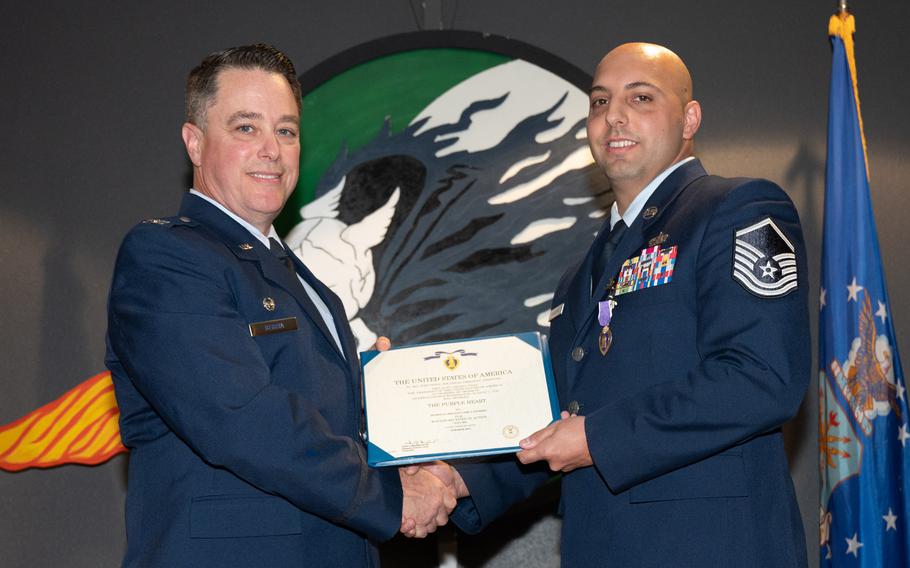
U.S. Air Force Colonel Jeremy Bergin, 27th Special Operations Wing commander, presents the Purple Heart to U.S. Air Force Master Sgt. Cory Engberg, 43d Intelligence Squadron Silent Shield Maintenance Production superintendent, during a ceremony, June 15, 2023, at Cannon Air Force Base, N.M. Engberg received the medal for wounds received in action during his deployment July 7, 2021, in support of the 16th Expeditionary Special Operations Squadron. (Alexcia Givens/U.S. Air Force)
U.S. Air Force Master Sgt. Cory Engberg received the Purple Heart medal this month at Cannon Air Force Base in New Mexico for wounds received in action during his July 2021 deployment in support of Operation Inherent Resolve, according to an Air Force news release.
The Purple Heart is presented to service members who have been killed or wounded in the line of duty. It is one of the oldest military awards, and it symbolizes the sacrifice the recipient has made.
“I am proud of what I have accomplished and future airmen might test for promotion on questions about operations I took part in,” said Engberg, who has been deployed eight times and served more than 1,000 days. “I am coming close to the 20-year mark and I think it’s time for me to step out of the way and let the next generation of airmen lead.”
A Silent Shield Maintenance Production superintendent assigned to the 43rd Intelligence Squadron, then-Tech. Sgt. Engberg was deployed in support of Operation Inherent Resolve. He sustained his injuries during a coordinated rocket attack against the forward operating base where the 16th Expeditionary Special Operations Squadron was based.
“I’ve been on the receiving end of probably hundreds of munitions over all my deployments, and reacting to it is second nature for me,” Engberg said in the release. “There isn’t any time to really think in these situations. You can feel the anxiety and adrenaline, but it’s all muscle memory. If you’re thinking about anything it’s ‘Locate the nearest cover,’ and ‘I really hope this round doesn’t hit me.’ ”
There was an indirect fire impact from a 122mm rocket about 30 feet from Engberg as he ran, forcing him to the ground.
“It is a very surreal feeling to be hit by an explosion and live,” Engberg said in the release. “In the moment, it was absolute chaos feeling the rockets landing closer and closer, then all of a sudden it was silence. I felt completely at peace and lost all sense of what I was doing or where I was.”
Engberg, a native of Fredericksburg, Va., made it to a hardened bunker site after collecting himself, but he was confused. The entire area was filled with dust and sand, and he said he felt like he was dropped into a horror movie. Others around him were reacting to what turned out to be a rocket hitting a nearby operations building.
After the attack, Engberg was diagnosed with a concussion at a regional trauma center, where doctors determined he had suffered a traumatic brain injury. He was back in the line of duty four days later, carrying out a forward movement in support of the Afghanistan withdrawal.
Engberg said he should have medivaced to Germany for follow-up treatment, but he was responsible for a lot of equipment and material that needed to be moved for that deployment.
“I felt it was my responsibility to coordinate these actions and safely secure every item during this transition, and I didn’t give much thought on my personal well-being,” Engberg said in the release. “In hindsight this wasn’t the smartest choice since no one truly knew the extent of my injuries since I had no imaging done up to this point.”
The mentality of not quitting when he was needed the most got Engberg through the deployment and the transition back home, he said.
“I think it’s always more important to talk about the actions of individuals and how that impacts the people around them rather than focusing on how they got hurt in combat,” Engberg said.